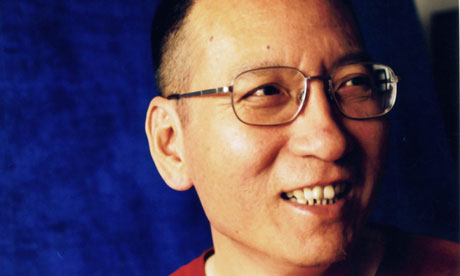Activists call for David Cameron to press Beijing over human rights record
Campaigners urge prime minister to take firm stand to support freedom of speech in the country during his trip
Originally published by guardian.co.uk, 08 November 2010
By Tania Branigan in Beijing

Before the prime minister had even taken off from London critics were expressing concerns about the British government’s stance on human rights.
David Cameron‘s aides have indicated he will raise the case of jailed dissident Liu Xiaobo, this year’s Nobel peace prize winner. But campaigners want to know how he plans to do so.
“If you support freedom of speech you should be raising that publicly,” said Liberal Democrat peer Lord Rennard, who has tabled a question in the Lords asking how concerns over Liu will be raised.
Amnesty International criticised business secretary Vince Cable’s remark that “I don’t think we will approach [human rights] by lecturing them, but they know this is part of the wider political and economic framework in which we operate.”
More pressure for a “firm stand” came from the Free Tibet campaign, which cited its ICM poll showing three-quarters of Britons thought protecting human rights in Tibet was at least as important as maintaining good trade links.
Although there are increased personal freedoms, greater space for expression in some regards, and an embryonic civil society, many observers are concerned about China‘s direction on human rights.
Human Rights Watch’s annual report cites increased pressure on lawyers and human rights defenders (one, Gao Zhisheng, has simply vanished); tightened controls on Uighurs and Tibetans; the jailing of journalists; extensive and sophisticated internet censorship; the world’s highest number of executions; forced confessions; the lack of fair trials; restrictions on religious practice; and inadequate labour rights that prevent workers from forming independent trade unions.
Beijing argues that the west is imposing its values on a different culture, that the true measure of human rights is its success in lifting people out of poverty, and that countries are hypocritical to criticise its record while invading others.
But some Chinese citizens want foreign countries to apply pressure – as artist Ai Weiwei urged Cameron to do in a comment piece for the Guardian today. Ai was placed under house arrest last week, but was scheduled for release yesterday.
The dilemma visiting leaders face is not only weighing human rights concerns against others such as trade, but calculating what methods will prove effective. An outspoken public stance may simply anger their Chinese counterparts; a private discussion may be too easily swept aside.
“You can be pounced upon by realists who say, ‘It’s grandstanding and just talking to your voters’, and at the same time be excoriated by human rights activists who say, ‘He didn’t say enough or make a public statement’,” said François Godement, senior policy fellow at the European Council on Foreign Relations.
“China’s take on this is to seize on the nuances of difference in behaviour between these visitors to try and lead everyone to what you would call the lowest common denominator.”
Like many China watchers he believes Western countries are becoming more hesitant, comparing Nicholas Sarkozy’s muted comments during the Chinese President’s visit to France last week with his trip to China in 2007, when he spoke about the Dalai Lama and gave an award to human rights lawyers.
That shift in part reflects China’s rise, suggested Godement, but also its increasingly tough approach. Earlier this month, diplomats in Oslo said the Chinese embassy had warned them not to attend the Nobel peace prize ceremony.
“If European ambassadors don’t go, that it is a true scandal – it means China can dictate what European diplomats do in Europe,” Godement added, though the British ambassador and others are expected to attend.
It is hard to judge what methods can move Beijing.
Many think persistence helps; returning to the same issues shows they are taken seriously. Tact has a part too. Phelim Kine, Asia researcher for Human Rights Watch, says leaders must be open about discussions so that the public can judge whether they are substantive. But he also warned that “emotionally loaded language” was unnecessary and counterproductive.
Godemont has called for greater unity among European nations. But he acknowledged: “It is easy to recommend, but not easy in practice. Look at China’s economic diplomacy these days.”
http://www.guardian.co.uk/world/2010/nov/08/activists-david-cameron-beijing-human-rights

